What to Create with Colored Pencils? – Watch the Video!
This week I have a short inspirational video for you. I wanted to make a video that I can share on Instagram, so this has different portions than my videos usually are. You can watch it bigger by pressing the last icon on the menubar below the video.
Most of these drawings are made with regular colored pencils (or crayons as some call them) and some with watercolor pencils. I love both.
Coloring Freely on Blank Paper – Simple Start!
I am an advocate for coloring freely – starting with blank paper, adding colors on top of each other, and getting excited about what comes up. This doesn’t have to be anything difficult. Here’s an old picture from 2015 that I still find inspiring. You can illustrate your journaling with freely colored boxes.
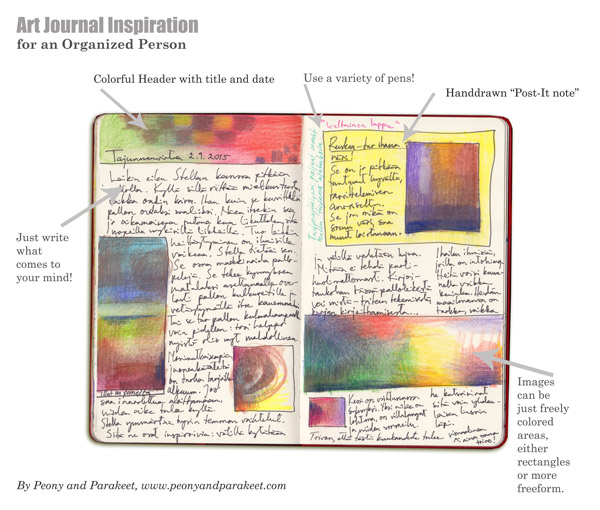
Children draw freely with colored pencils, but when they grow up and become “colored pencil artists” they need all kinds of references to get started. References are great for learning some techniques, but they don’t make anyone an artist. A big part of art is in our mind – how we open up and how we allow ourselves to break boundaries.
Growing Your Skills
My love for colored pencils is based on a promise that I have made for my inner child: I will color for you and help others to color for theirs. So even if I make oil paintings and media art too, colored pencils always have a special place in my heart.

So, welcome to my courses to improve your skills and expand your artistic thinking!
P.S. You can still sign up for Joyful Coloring!
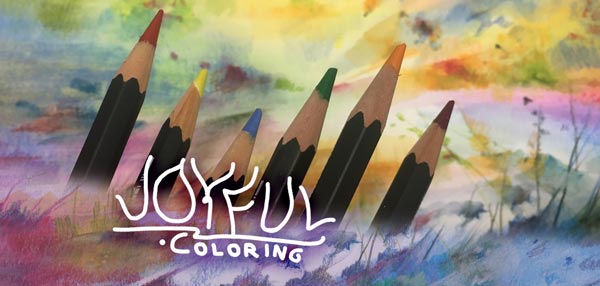
Last Bloom – Watercolor Pencil Inspiration
This week we celebrate watercolor pencils and the lifecycle of flowers. I hope this post fills you with watercolor pencil inspiration!
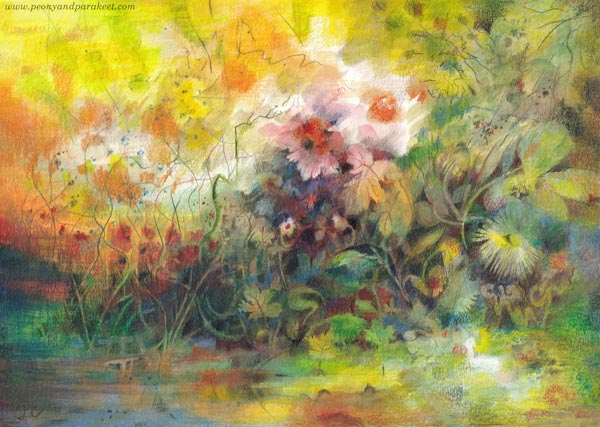
We in Finland have had a warm fall and many flowers are still blooming, even though it is already September. It inspired me to use yellows and oranges, which I love anyway.
Comforting Watercolor Pencil Inspiration
Lately, I’ve been editing videos for the upcoming course Joyful Coloring, which I recorded for the most part in the summer. I don’t know if the teacher can say it herself, the students decide that, but the videos are so inspiring!
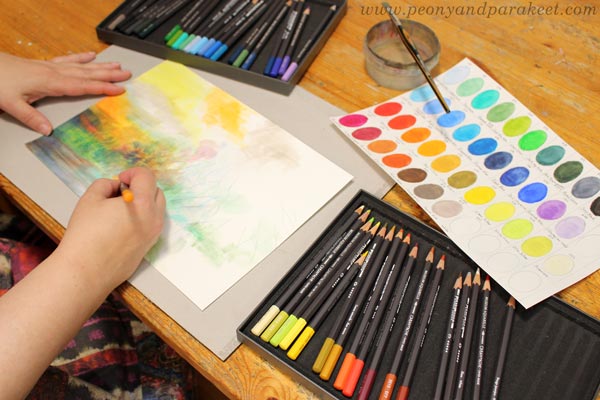
So watercolor pencils are really calling me now. I bought 20 more when I found them quite inexpensively, even though they are a good brand: Caran d’Ache Museum Aquarelle. And I also bought more paper – Fabriano Accademia Drawing Paper. It is not watercolor paper but works well for colored pencils and is more affordable. When you draw a lot, pencils and paper get used up.
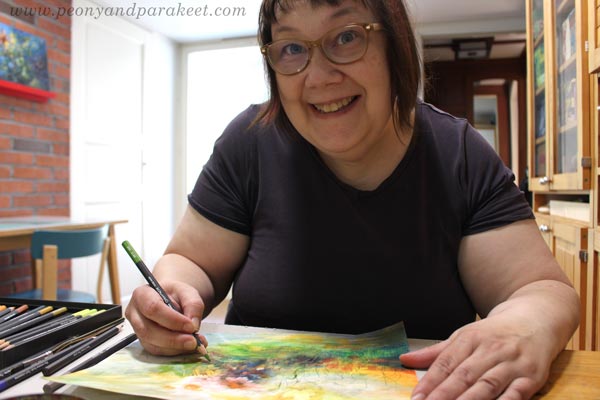
One of the best things about my job is that I can make “comfort drawings” for the blog. So, in the same way that there are comfort books, or comfort food, or comfort music, you can also make comfort drawings.
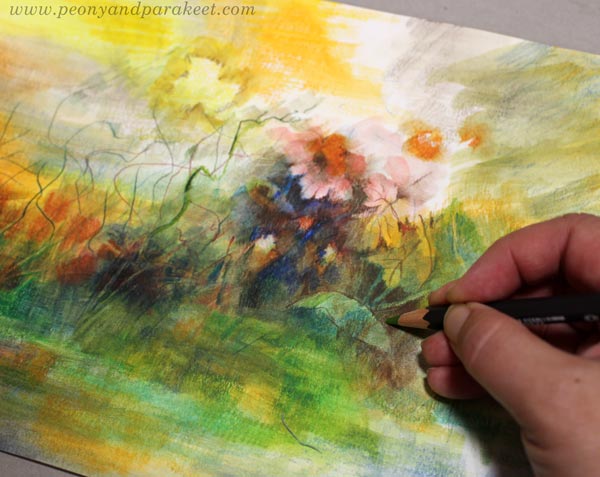
You can let colored pencils take care of all worries and unnecessary thoughts. Float in the sunshine and focus on everything beautiful!
Filling the Desert
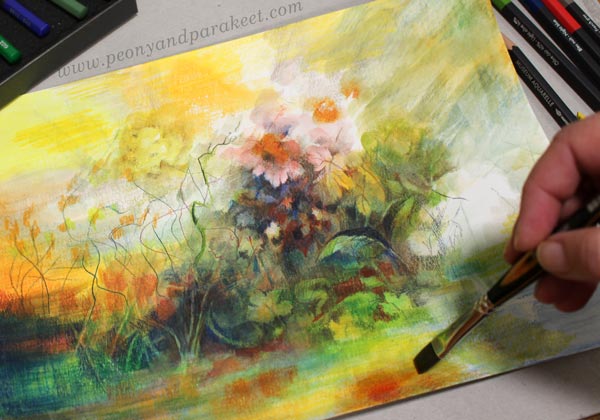
I like to start a drawing with a scenery, which I then fill. This method is also taught in the course Joyful Coloring.
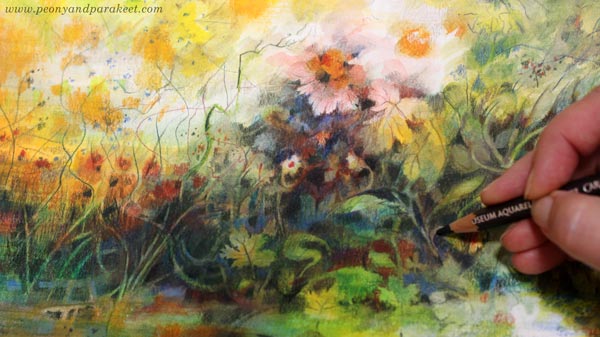
When immersing in the details, you can enjoy the fact that the world shrinks into a tiny area. I think that everything great and wonderful starts small. When thoughts decrease, possibilities expand. Then it is easier to invent and learn new things.
Meadow is a Town
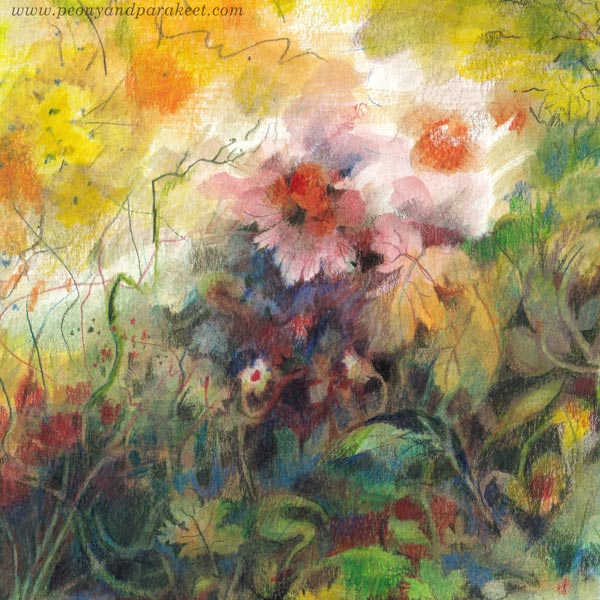
I have looked at the last flowers of summer and admired their details. It’s amazing how much there is in a small meadow flower: stems, seedcases, and flowers and leaves in different stages. And when you multiply those, the group of plants forms a busy town. A meadow is like an upright map of intersections, stations, and roads that guide the bees.
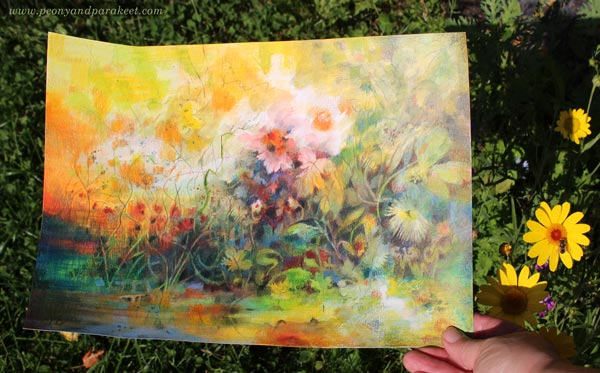
Colors of this kind of world are coming and going. Nothing is permanent and yet everything is so comforting and full of life.
Joyful Coloring – Sign up Now!
The new course Joyful Coloring begins on Sept 16!

Get your watercolor pencils and join me to create freely with joy and sunshine! >> Sign up now!
Joy of Nature in Colored Pencil
This week, we learn from nature and bring its joy to our colored pencil art.

It makes me sad how colored pencils are used only for replicating photos, and how little there is room for free expression. Nature grows freely, so why not give our art the same opportunity? I hope this post inspires you to do more intuitive coloring!
Joy of Nature: Patchwork
Think about nature sceneries as crazy quilts that have fabrics and seams! The fabrics are larger areas and the seams are lines. Patchwork has short seams, so keep your lines quite short too.

When you walk in nature, stop, and see the quilt by searching for the mesh of trees and bushes. Observe how twigs cross over each other and form nature’s patchwork.
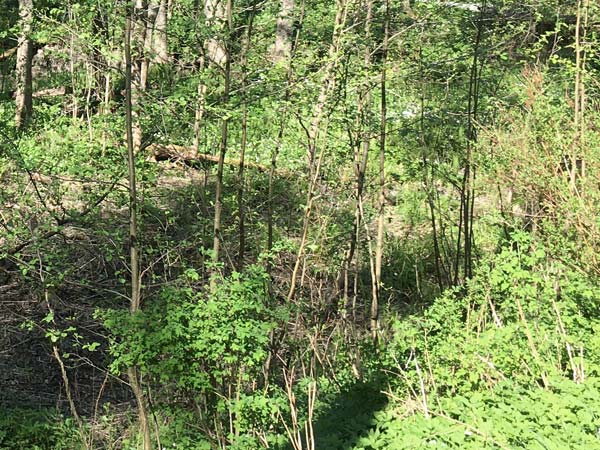
Then when you start coloring a blank paper, focus on building the asymmetric and abstract style quilt, rather than thinking about trees and such.

I find this kind of “patchwork coloring” a lot of fun. Many call this mark-making, but I like to think about creating a patchwork instead. Marks are a more abstract term but textiles connect me to the creative world that is full of ideas.
Joy of Nature: Harmony
Despite its patchy structure, nature sceneries have harmony that our art often lacks. When you walk in nature, step back to admire the big picture and point out the areas by their dominating colors. You could think that the sky and earth both have a few quilts: patchwork areas that mostly have similar colors.
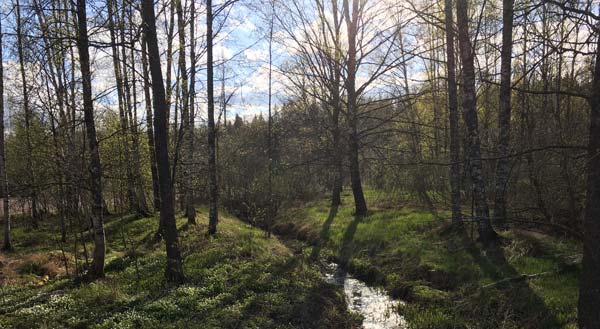
So, when your paper has all kinds of patchwork, compose larger areas by coloring over them so that they get a stronger identity in color. For example, you can have a couple of green areas, a dark area, a more neutral brown area, and one with very light colors.

So, first, you start coloring gently with a wider color scheme and then add larger unified layers over the colorful patchwork.
Joy of Nature: Spirit
I like to think that light is nature’s spirit. When you walk in nature, seek for this spirit. You miss the spirit, if you only point out the big concrete things in the scenery like bushes, trees, water, and sky. To see the spirit, you have to step into the abstract world and look for the light: odd shapes on the trunks of the trees, pattern play on the leaves, and in general, all kinds of small reflections.
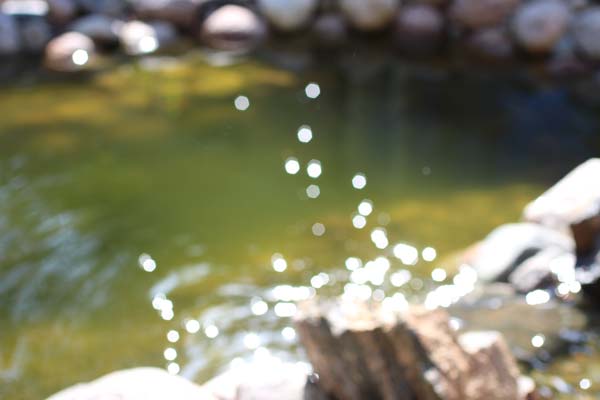
For me, it’s helpful to think that the spirit has twins. One is the light and the other is the shadow. When you want more light, you will also get stronger shadows.
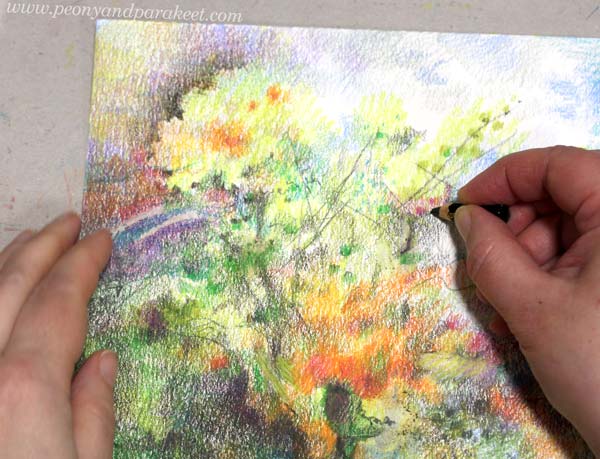
Light and shadows add contrast and scatter. When you add them to your piece, it becomes less harmonic, but also less boring.
Joy of Coloring Small
Recently, my colored pencil pieces have been quite small, and the paper has been divided into smaller pieces.
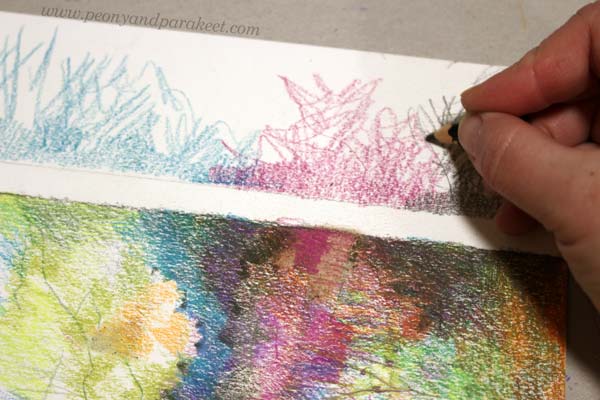
Coloring can be a bit like weeding: you can do it little by little.
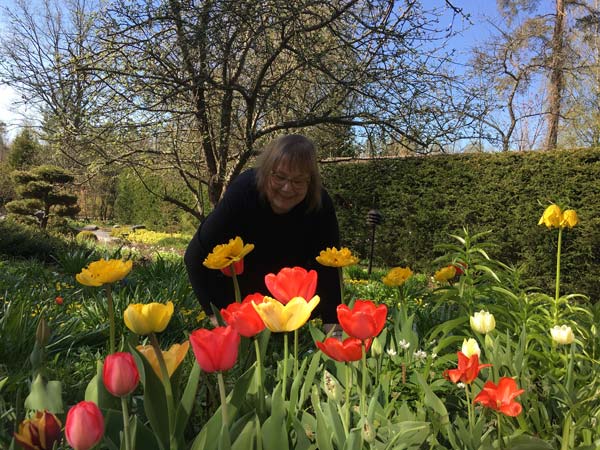
First, the result is nothing, but it will bloom over time.

Colored pencils beat other supplies when we are creating this kind of small joyful art.
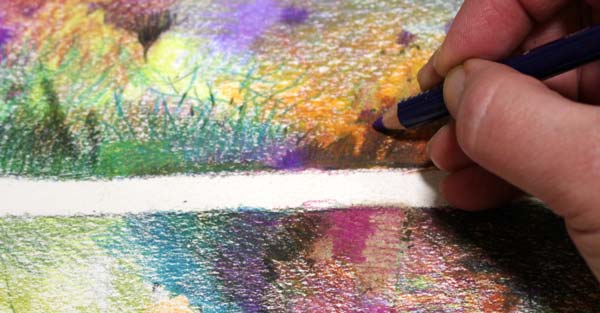
Here one A4-sized paper has two pieces of colored pencil art. So, you can take short walks or long walks to express the joy of nature in colored pencil.
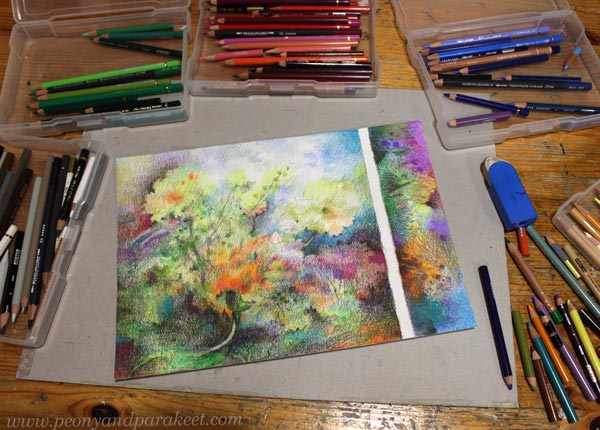
Mother Nature is the best art teacher. That’s why most of my classes are about what I have learned from her.
Coloring Without Limits
This week, I want to talk about colored pencils and coloring without limits. You can color without a preconceived idea, without outlines, and without sketching.

You only need to feel drawn to one color first. Recently, purple-blue has called me.
What to Draw?
Have you ever been thinking about what to draw when everything in the world seems to be drawn already? Maybe you too have wondered whether you draw a face, a bird, or a flower, and if so why. But there is always a secret path in art – the possibility to deviate from the traditional path at the very beginning and see what appears on paper freely.
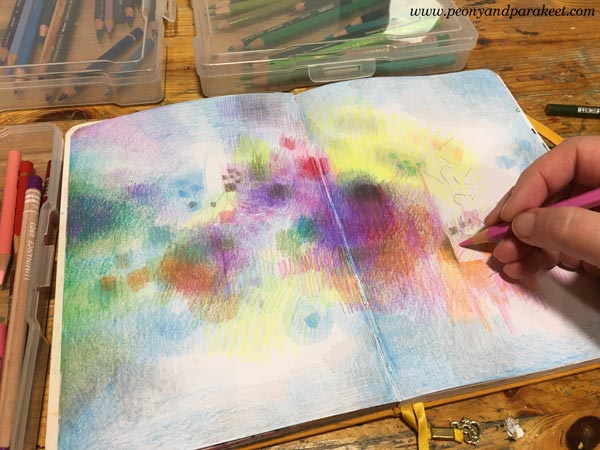
I have a small colored pencil journal where it’s easy to make a spread now and then.

This was a quick and fun little project.
Choosing Paper with Colors
The smoothness of the paper affects the coloring experience. Single strokes are better visible on smooth paper.

My colored pencil journal has very smooth paper, and I find it less effortless to color than a rougher one.

But when I want the colors to shine more and achieve a little blurrier and thus a softer result, the paper is better when it has some tooth.

I currently have a pad of Fabriano Accademia drawing paper and it’s very nice with colored pencils.

I keep my pencils organized by color. All brands are mixed in one box. Some are watercolor pencils, some are regular, and all of them are in the same mix.
Just Start! – Two Tips
Bring the pencils to a place where you can see them often. And then …”Just start!”
Sometimes it’s easier said than done. When getting started feels like a chore, I have two tips for you.
First, let the color do the talking. Pick a pencil and examine it’s tone. Color lightly first, and then bring in more layers. Every color has a spirit. Connect with it like it’s your pet or an angel. You don’t need to rationalize why you feel drawn to this or that color. Find the pencil that resonates the best with your current self.
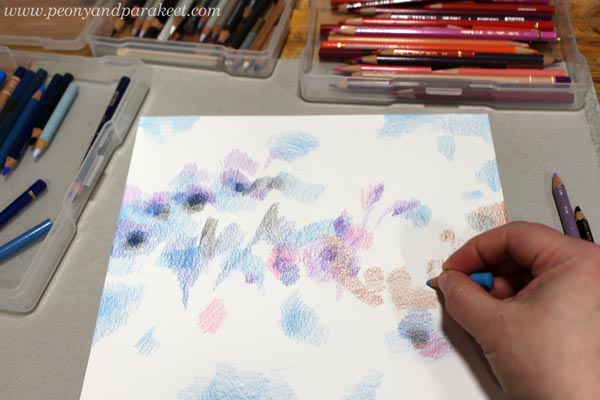
Second, give the color at least two other colors as friends. Often one color is very little, but when it’s side by side with two other colors, art will appear. A shape that has only one color is flat but with two other colors, it becomes much more lively.
Colored Pencils Say This All The Time
I know many colored pencils complain that they always have to create something figurative and realistic. They envy paints who can roam freely on paper and how people only smile at their tricks. Colored pencils are too often squeezed tightly and pressed hard against paper at the very beginning. They have to follow strict discipline and are under pressure to produce something that looks real. And when they try to do exactly as they are told, the result is stiff. “Nothing like what can be achieved with paints,” their owners say which makes the pencils sad. If they could choose they would be coloring without limits.
I believe in free education when it comes to colored pencils: “Make what you want and enjoy!” I often say to them. “Imagine that you are something more than just pencils!”
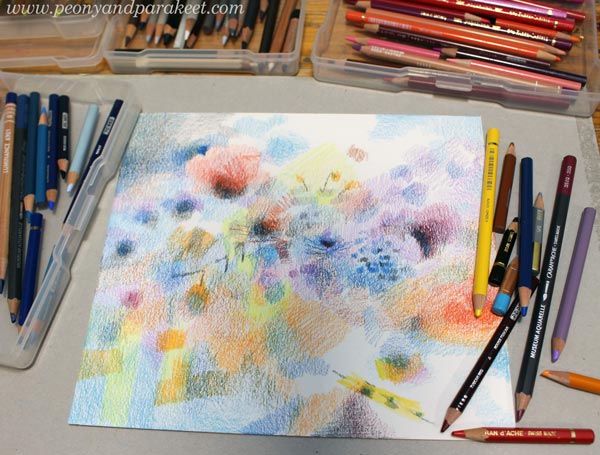
My pencils jump out of their boxes and do all kinds of silly marks. They are like paints.
Without Limits – Imagine You Are More!
In art, it is terribly important that we imagine to be more than what we are. Be more skillful, more innovative, more unique, and more important. Then, at that very moment, the pencils, life, and fantasy cannot be separated. The colors speak inside us and the art steps in.

Love of Coloring Without Limits
When I was a child, colored pencils often kept me company. They still bring me joy and I want to keep staying their advocate.

Get 20 % OFF from the classes Intuitive Coloring and Fun Botanicum!
The sale ends on Sunday, May 5, 2024, at midnight PDT.